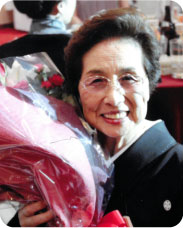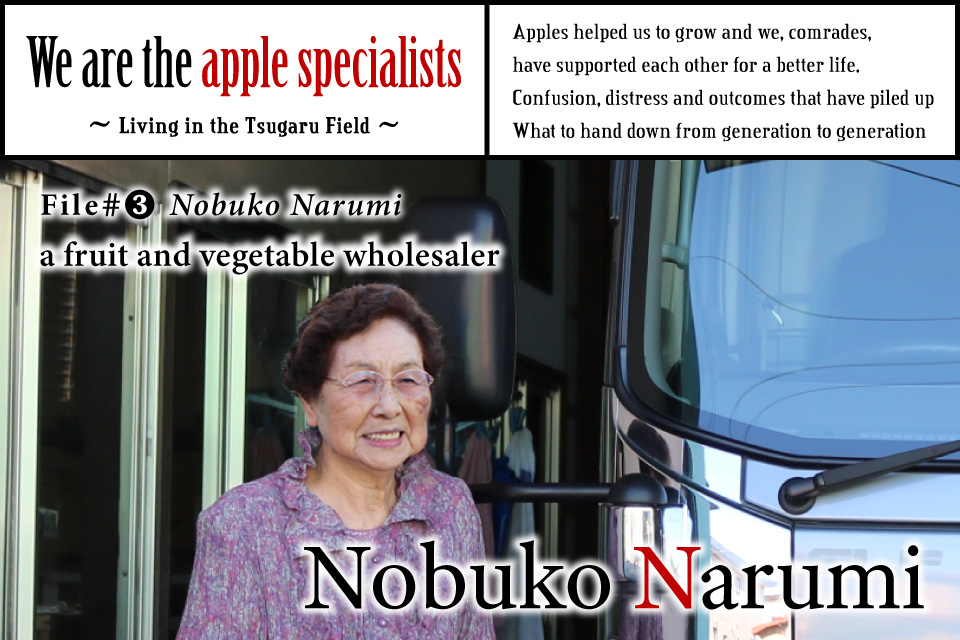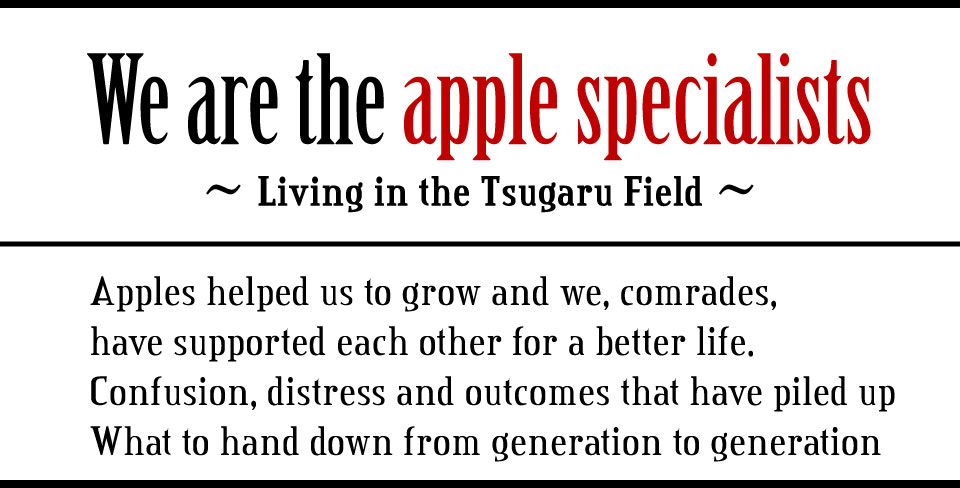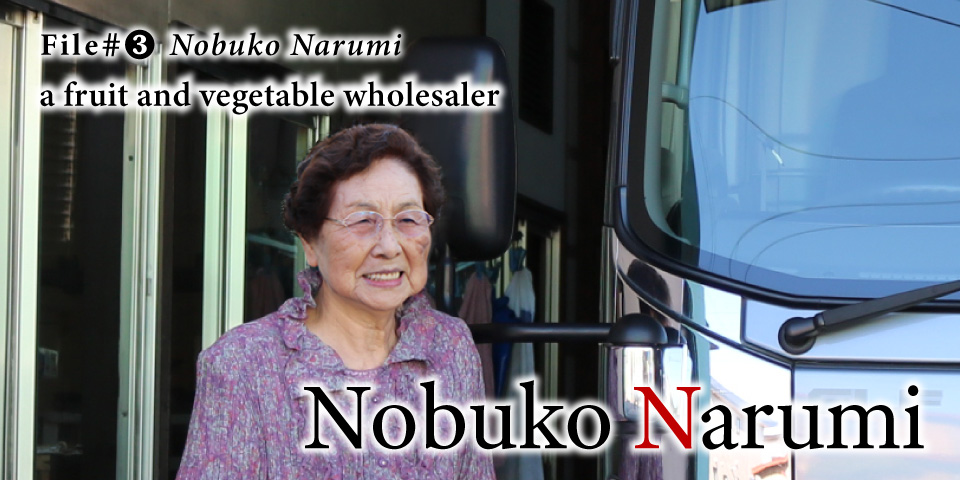File#③ Nobuko Narumi
There is a woman who was born to an apple farmer, started peddling apples upon marriage, and has traded apples for many years. She is Narumi Nobuko, 85.
She is from a farmer family in Shimoyuguchi, Hirosaki. Born on July 10, 1932, she was the fifth child of 8 siblings. This is one of the most active areas for apple cultivation in Hirosaki. Nobuko was a tall girl in her childhood and her parents used to call for her help with farming. Her two older brothers were already serving in the military and her older sisters were married at that time. Her younger sister had a small build and the younger brothers were too young. So as a tall girl she naturally helped the parents. She started helping when she was an elementary school student and later when she was in high school, and she often missed classes because of the farm work. “My parents relied on me because I did what they expected and I never ran away from the work after getting tired,” she said as she recalled her days.
In 1949, she married a man, in an arrangement by her parents. The husband’s family ran an apple retailer in Omachi, Hirosaki. Masanao, her husband, was the third son of the family and served as an imperial guard in the palace. In the beginning, Nobuko’s older sister was supposed to marry the family’s first son. But both the first and the second sons served in the military and the second son was killed in the war. The first son was missing in action. So Nobuko’s sister married another man. Masanao was called back to Hirosaki to succeed the family business and got married to Nobuko by arrangement. In 1950 she gave birth to their first daughter and they had a calm life. Then Masanao’s oldest brother suddenly came back to Hirosaki. At the same time he married and took over the business. Nobuko and the family were almost forced to leave the house. This unexpected situation brought them uneasy days, but after she delivered their first son in 1954, the family was able to settle down. However, at that time, Masanao’s family decided to start a restaurant business and Nobuko was called to help them, so they returned to live in the same house together. In this way, she was at her in-laws’ beck and call for several years.
Her start as a peddler
Even though Nobuko was helping with the restaurant, she was not paid. She felt uncomfortable in the family, and didn’t get along with her sister-in-law. Then Masanao’s aunt returned to Hirosaki, owing to Japan’s withdrawal from the war, and started peddling apples. Nobuko was 23 years old. She found a space at the in-law family’s property which was being rented out to a newspaper delivery company. There was a board to sort out newspaper. The space also served as a place to keep peddlers’ baskets. It was a place with peddlers always coming and going. Masanao’s aunt started to become one of them. Nobuko thought, “Since my parents grow apples, I could make money by selling them.” She accompanied the aunt out of curiosity at first. It was her impetus for becoming a peddler, with apples on her back.
There was a ferry boat between Aomori and Hakodate then. Because of that, lots of people came and went and she could make a lot of good sales. She said shyly, “It was a good time for ferry boats. And it was rare to find a young woman selling goods in those days.” There were many peddlers, but not too many young women worked as one. She started just out of curiosity, but as she was able to make money and found it interesting, she decided to continue the work. She told us with a smile, “I was helping the restaurant for nothing, but I could earn a lot from selling apples.”
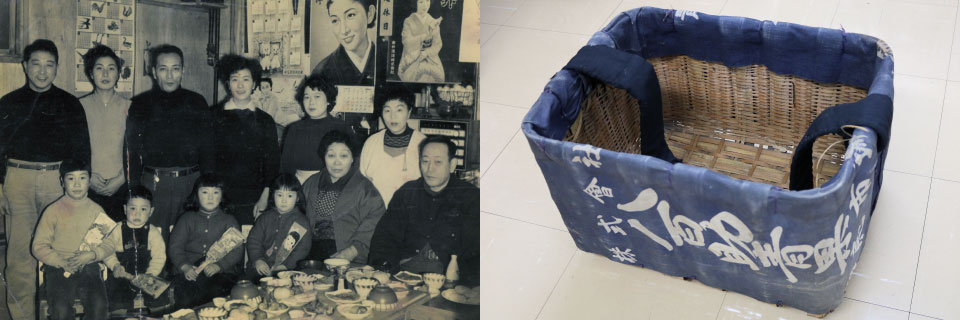
(right) The basket Nobuko actually used on her back
In the beginning, she received apples from her parents in Shimoyuguchi. She carried two boxes of apples by bike to Omachi, a distance of about 6 km. Then she took them on her back to Aomori by train to sell. Later she started to buy apples from some shops near Hirosaki Station, or participated in the auctions at Daijoto Seika (ex-Yaosuke Seika) or Onaka Seika (the predecessor of present-day Hiroka Hirosaki Chuo Seika) to purchase apples. She put one box full of apples in her pannier, and stacked another box of apples on it. She carried two boxes full of apples on her back to Aomori retailers. She was an intermediate wholesaler who sold goods to shops, not to customers directly. She added 500 yen onto each box, so she made 1000 yen by selling 2 boxes. In those days a male laborer could earn 300 yen per day, while a woman made 200 yen. She was making a lot more compared to them.
Every time she sold apples to a retailer, she received another order at the same time. So the number of orders increased. She had to carry many boxes, but no trucks were available. She was limited to taking the train to Aomori alone. Luckily, she lived just two houses away from the station. She used a two-wheeled cart to carry boxes to the station, and loaded them on the train to Aomori. But it was hard to carry them from Aomori Station to the retailer. As she commuted many times between Hirosaki and Aomori, she noticed people who specialized in carrying things on their back.She decided to hire them. “There were many of those who carry panniers. I didn’t have to ring them.” As she told us, those porters got on the train from the Namioka or Daishaka stations, which are between Hirosaki and Aomori. And on the train she gave directions on where to deliver the apples. They took two boxes of apples for 200 yen. Since she made 500 yen profit per box, she could still earn enough. She sometimes traveled to Aomori twice a day. Despite her being busy, she found pleasure in earning money by selling apples. Also, she became acquainted with a milk man and he kindly offered to help with the transportation of apples from Hirosaki to Aomori. Due to what may be her innate cleverness, she met various people as a trader and was able to continue her business in cooperation with them.
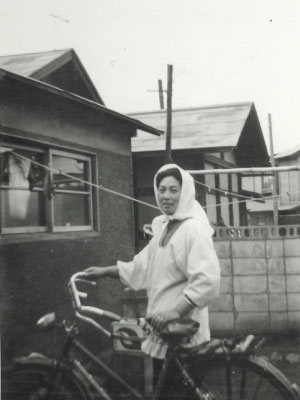
Nobuko, who used to be a peddler
The husband’s death ~ the breadwinner of the family
In 1960, her husband’s family built a house of just a single room for her family. So Nobuko and the family moved out of the in-law’s house. Her husband was helping with the restaurant, but he was not suited for the job. It was hard for him to find a job in his hometown, so he went to work in the city. While Nobuko was working as a peddler rearing the children by herself, her husband suddenly passed away from a stroke. She was 32 years old. She said regretfully, “When we worked as peddlers together, he felt uneasy since his family was running a large apple store. He decided to leave the town because of the stress. He had suffered from high blood pressure, but he was too stubborn to see a doctor.” Even after his death, Nobuko had to devote herself to her business in order to rear her children left behind, and did not have enough time to grieve over her husband’s death.
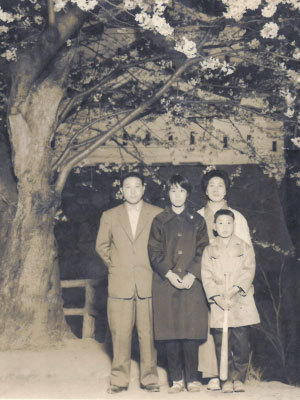
The last picture of the family of four (at the cherry blossom festival in Hirosaki)
In 1965, she purchased a 1-ton pickup truck and shifted the work from peddling to truck transportation. She didn’t need to mind the departure time for the train, so the business became much more productive. The business was satisfactory, but in the auction market she was still one of the rare women to participate. The rivals used to claim that it was a distraction to come by a “cart.” They made fun of her for the small size of her truck. There were not too many 2-ton trucks around then. She knew she was being insulted, but she had to continue the business as the breadwinner of the family under these difficult conditions. And gradually she bought larger sized trucks.
Being a successful woman, she built a new house in 1968. Also, she bought a property in Joto, Hirosaki in 1971 to construct a warehouse and a refrigerated warehouse, and expanded the business. “I have a policy not to borrow money from a bank. I used to save enough money to buy any expensive goods. I think I made a lot of profit in those days,” said Nobuko, as if it was someone else’s affair. In less than 10 years after her husband’s death, she could build her private house and two warehouses without any loans. It showed how fair her business was performing. It was the result of Nobuko’s exceptional efforts.
Business continues thanks to support from her peers
As the breadwinner of the family, Nobuko devoted herself to the business more and more, but at the same time she found business transactions interesting. People naturally offered her a hand since she was charming and friendly. One day she got ready at 4am in the morning and went to Aomori to sell apples and take orders. When she returned to Hiroka* in time for the 8 o’clock auction, she had cash with her from the sales of the day. Since transactions at Hiroka were based on credit sales, she was going to leave the cash in the truck. When the director of the market saw this, he offered her to keep her wallet until the auction ended. Later he brought the wallet back to her. He kindly cared for her after that as well. “He was very supportive,” she said, remembering those days.*Formerly Dainaka Seika
As a matter of course, the apple business gets extremely busy in fall when the harvest begins and a work force is needed. Her daughter, who became a company worker after graduating high school, helped her starting in October every year. But the work load was so much that the daughter had to quit her job after one and a half years in order to help Nobuko’s business.
One day in 1972, when the business was going well enough, her daughter drove a truck to Aomori with Nobuko and ran into a car from behind. Nobuko was badly injured and hovered between life and death. “I stood at the edge of the river, but someone, maybe my late husband, yelled not to cross over. Then I gained consciousness,” she said of the unusual experience. The president of Hiroka visited her in the hospital with a basket of fruit. She recalled being pleased but sorry that he had taken the time to come see her. At the same time, she was ready to quit the business because her son was finishing high school and planned to work for a company.
During her 8 month hospitalization, she was away from her business and rented the warehouse to another person. Even after she was discharged, she recuperated at her home while doing rehabilitation. After recuperating for a year at home, she met the director of Hiroka. He was glad to see her recovery and said, “You can rent a space at the Aomori Fruit and Vegetable Market and open a shop. We can deliver apples to you if you give us a call.” He encouraged her to do business again. At the same time, she started receiving orders from ex-customers, one after another. Her decision to quit the business started to waver. She turned down the offer to open a shop, but received the favor of renting a truck from them in order to restart the business little by little, with the help of her older brother. As she returned to work with him, she became active enough to live her own life. She finally decided to manage her own business seriously, partially due to the increasing number of orders.
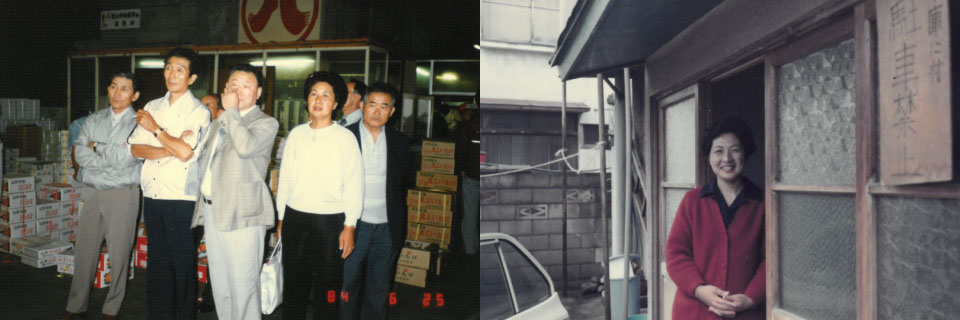
(right) In front of her residence
As she returned to the business, she remembered the interesting aspects of it. She became more energetic with the job. There were Aomori-Hakodate ferry boat services then and many families that moved around a lot due to job transfers, who were good customers. The varieties in those days were mainly “Jonathan” and “Ralls Ganet,” with set prices. But Nobuko was dealing with well-ripened apples such as the “Star King”, “Delicious” and “Golden” varieties. Those novel varieties were what would now be called “mysterious apples.” But once the customers tasted them, they loved and bought them right away. She could make a larger profit since there existed no set prices, unlike the “Jonathan” or “Ralls Ganet” varieties. There were a few stores open from 3 to 6 am in the morning when the Aomori-Hakodate ferry was the major means of transportation between Honshu and Hokkaido. Nobuko sold apples to those stores, adding to her regular business hours, thus shortening her sleep time. The apple harvest season was also the tourist season for Lake Towada’s autumn leaves. So the sales of souvenir apples went well. She could earn a whole year’s income in 3 months, from October to December, the gift giving season in Japan.
She recalls her life after the accident injury. “I thank everyone in the market who cared about me so much. The president of Hiroka kindly visited me in the hospital and later I got an offer to open a shop in Aomori, which I declined in the end. I owe so much to the people in the market to have been able to continue my business,” she said.
Although she had decided to quit her business after the near fatal injury, she could survive and continue her trading with the help of many people around her. Her son, like the daughter who quit her job to help her mother, helped the business in fall. He used to be late for work when he couldn’t come back in time from Aomori in the morning. Nobuko said apologetically, “I thought I asked him to help only on weekends. But maybe on weekdays too. My children were victims.” Soon her son quit his job and decided to help the family business. In 1975 they established Narumi Shoten to start business activities. Then the daughter again returned to help the family.
Due to what may be called her charm, there were many people who cared for and supported her all the time. Being modest and thankful, Nobuko worked very hard. That may be what people found charming about her.
Effort and praying to the gods
Belief in gods was one reason why Nobuko found it possible to keep her business and raise children on her own after her husband’s death. “I could not even consult with my brothers. When things were going well, they would be jealous. And when there were bad times, they would laugh at us. I depended on no one. I would only consult with the gods, and trusted my instincts,” she said. There was a branch of Izumo Taisha Shrine near her parents’ house, where her second elder brother was adopted as a shrine priest, and her sister married a priest. So the priest’s household became her in-laws. Nobuko felt close to the shrine and prayed that she could purchase good quality apples to sell well every time she went to buy. The prices of Nobuko’s apples were a little higher than others and retailers were reluctant to buy at first. But once they were on display, they sold well. At the auction in the market, wholesalers competitively bought quality apples for cheaper prices. But interestingly, Nobuko sold hers better than theirs. “It must have been the work of God. I survived the accident as well,” she laughed.
But she wasn’t just praying to God. She commuted to the market every day in the hours before the auction began in order to inspect goods. There were many competitors in buying the gift apples in which Nobuko specialized. So the prices rose sometimes and she failed to make a successful bid. But she researched the market well enough to buy her targeted apples. She worked diligently to buy good quality apples, keeping her appreciation of others in mind.
Nobuko thus managed Narumi Shoten into a thriving business, due to her business talent and effort, together with her faith in God. Later her son got married and she got a grandchild, who she sometimes gave rides to the nursery school in her pickup truck. She continued working with her son and his wife.
In 1994 she received stomach surgery and decided to retire from the business. Until then she devoted herself to selling apples with her son.
At present -- living her days praying for her family
Setsuko Noro, a daughter of Nobuko, continued to help the family business after her marriage and childbirth. “I had to quit my first job because my mother needed a hand. I was to get up at 4 and had an accident while driving a truck. After they established Narumi Shoten, they needed a truck driver, so again I helped her. My mother influenced me so much,” she said with pride. “I also thank her for not feeling any financial difficulties, due to her successful business. And she is a tidy woman and is good at cooking, sewing and knitting as well. I respect her as a woman,” she added, looking fondly at Nobuko.
Her son, Masataka, who had taken over Narumi Shoten, also holds the post of president of Snowple Inc. and continues to expand the business to fulfill Nobuko’s wishes. He lost his father when he was in the 4th grade, and started helping Nobuko from the 6th grade. “When I was small, I was nursed at my grandparents’ house. But I was so loved by the people around me that I never felt lonely nor an inferiority complex from being in a single-parent family. That owes all to my mother’s hard work,” he said. He has a high opinion of Nobuko as a business woman. “It was rare to find a peddler who would try to expand the business in those days, like my mother actually did. I heard there were many difficulties. But her efforts to keep trading made my current career possible. Also, she taught me the basics of sales. One is the thorough inspection of goods at buying. I still take it seriously in my own business practices. I appreciate it so much,” he said, showing respect to his mother.
Nobuko describes her son as a dutiful child, helpful and never too ashamed of his mother being a peddler to introduce his friends to her. “Now he cares for me so much that he occasionally brings some rare fruits to me. I’m very happy to see my son succeeding my business,” she said proudly.
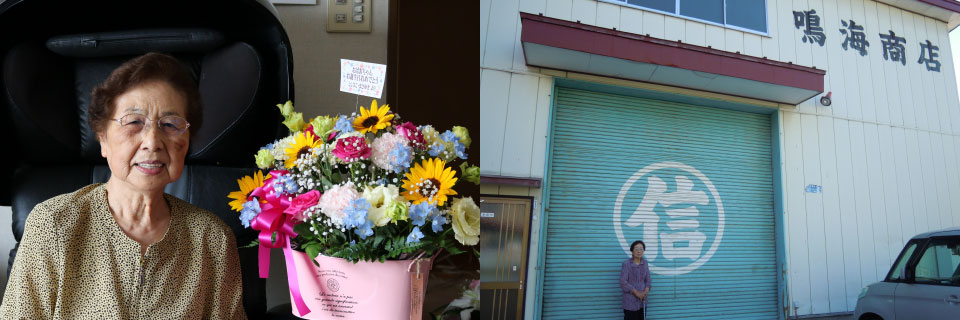
(right) In front of the warehouse of Narumi Shoten
Snowple Inc. is run by everyone in his family, Masataka as the president and Shizuko, his wife, and their two sons. They sell apples to supermarkets nationwide. So they have worked hard, not closing their business even on Sundays. This attitude may be inherited from Nobuko’s business mind. Also, it is thanks to the support of his wife, Shizuko, because she played a great role in the strong family bond.
Even after Nobuko left the management of the store in the hands of her son, she often visited them, since she was concerned about the business. She used to cook inari sushi, pickles, sweet rice cakes, etc. to feed them. The family was pleased to eat them. “I hear that most young people tend not to eat food cooked by the old. But my son’s family liked my cooking and ate it willingly,” Nobuko said joyfully. She has spent her retirement days cooking and serving food, gardening and decorating her front door with potted flowers.
Recently she started going to massage out of concern for her health. She doesn’t forget to pray to the gods at her household Shinto altar every morning, since it has been one of her routines for a long time. She prays for the family’s health, successful business, and the couple’s happiness, putting herself as a secondary importance. That is one reason why she is loved by the couple. They sometimes ask her to go out to eat with them. “I tell them that they don’t have to invite me because my legs are getting weak,” she said with a smile. After many years running a long-term business and sacrificing time with her family, she now feels happy to live a peaceful life.
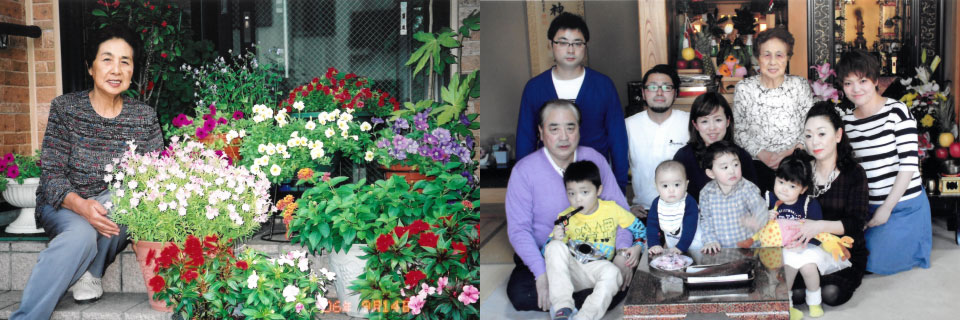
(right) With her children, grandchildren and great grandchildren
Written in May to June 2017
Published in October 2018
Profile : Nobuko Narumi
